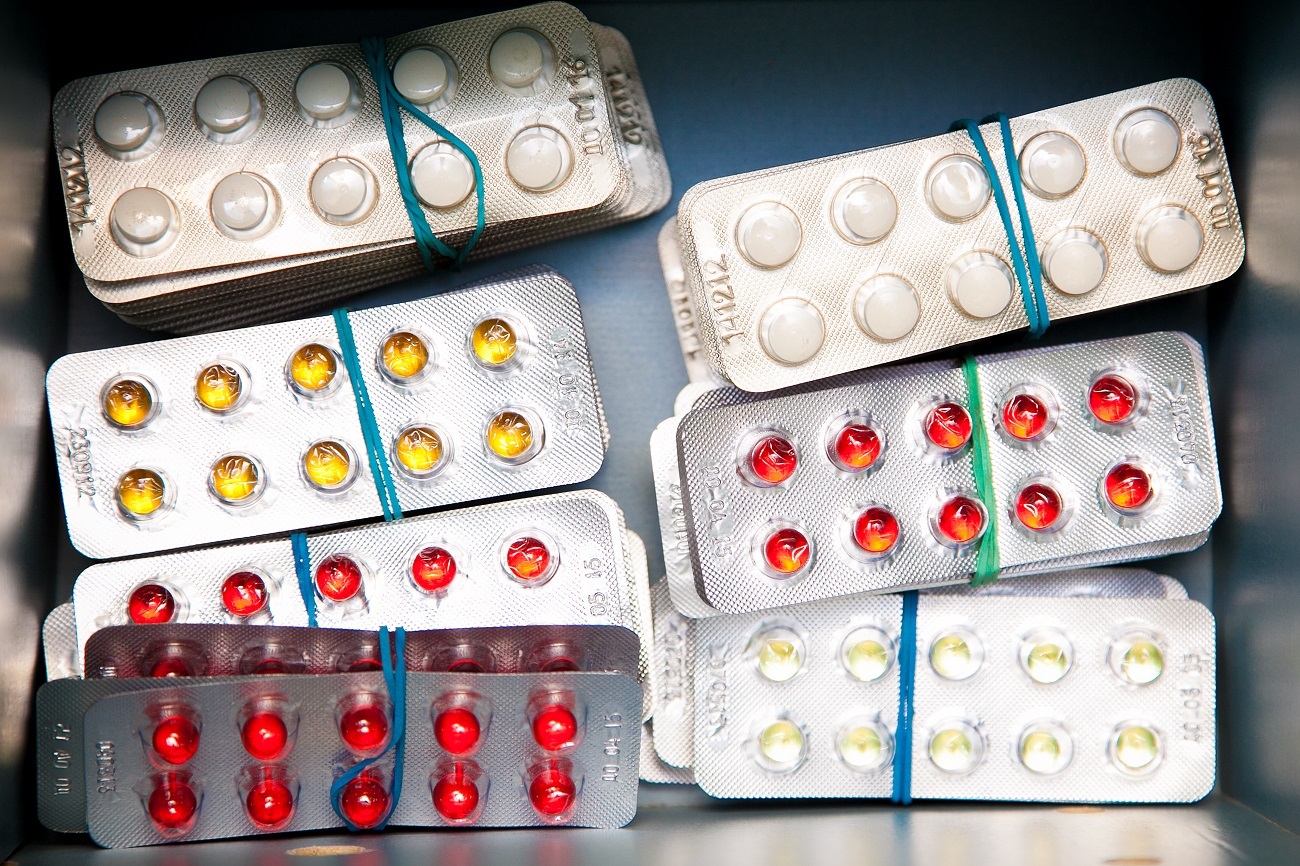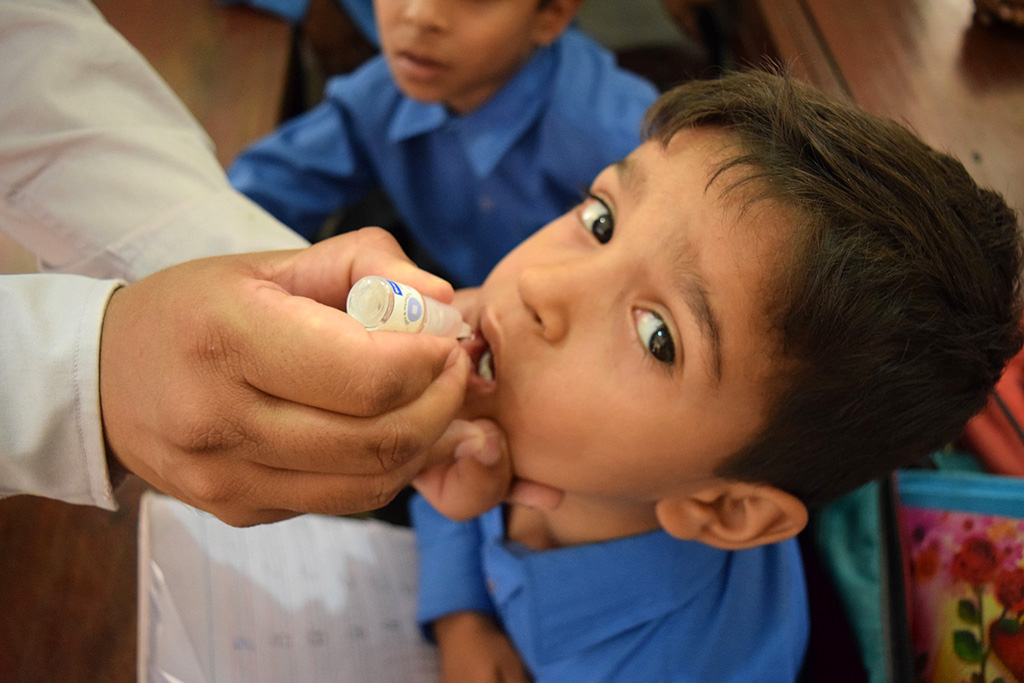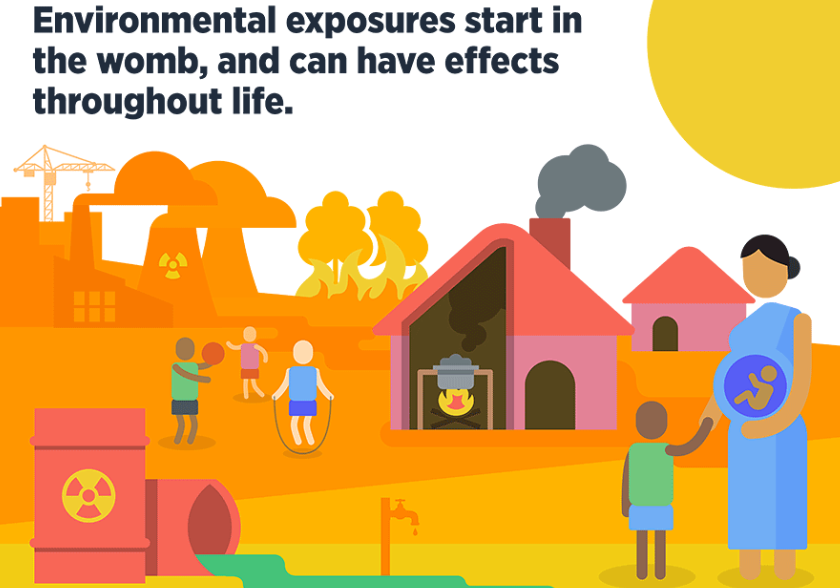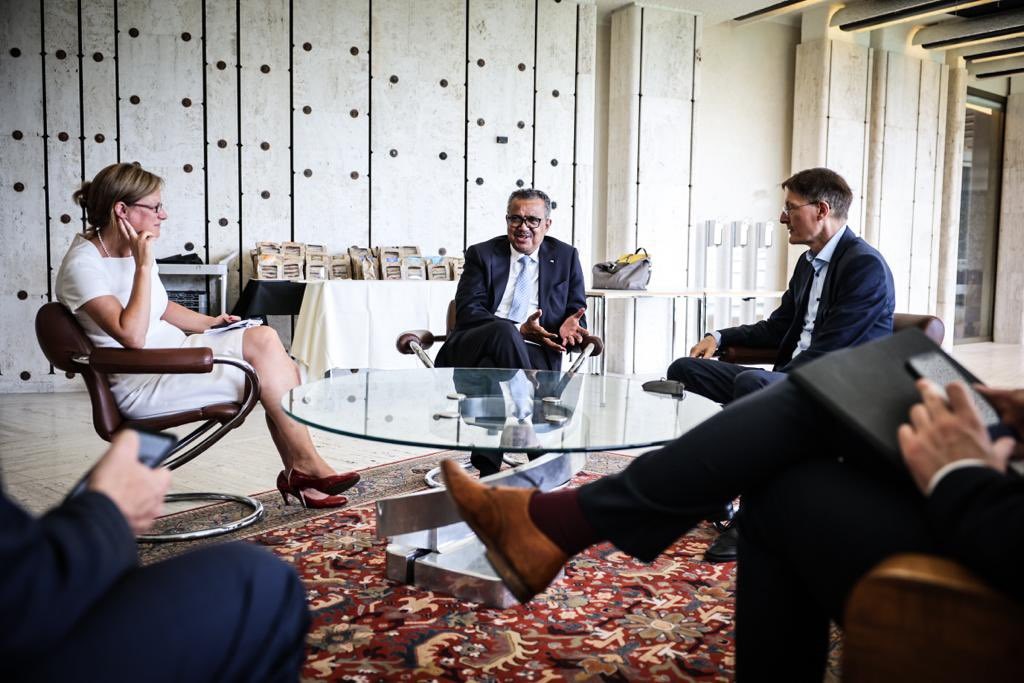
Germany
Partner in global health
This content was last updated on 22 September 2023.
Shaping global health
Germany is a strong public health leader, as demonstrated by its global health strategy and policies, and the experience, expertise, and funding it provides to WHO.
In 2018, Chancellor Merkel, with other global leaders, called on WHO to spearhead the development of a Global Action Plan for Healthy Lives and Well-being for All, to accelerate progress on the health-related Sustainable Development Goals. The Plan was launched in September 2019 at the UN General Assembly.
WHO and Germany are collaborating to strengthen global health security, combat antimicrobial resistance and strive for universal health coverage, driving impact in countries and helping to build systems which save lives and protect the vulnerable. Germany has consistently positioned health as a priority in international fora such as the G7 and G20. The Hamburg G20 meeting was the first to include a comprehensive health track in its discussions, where governments met to advance global health goals.
Germany is a staunch advocate for health, leveraging global platforms such as the UN Security Council, and other opportunities such as its EU presidency in 2020 or its G7 presidency in 2022.
Germany contributed to the G20 finance ministers’ economic action plan, endorsed by global counterparts, to tackle COVID-19. Germany is also a collaborator in the ACT-Accelerator, an alliance dedicated to rapidly developing and equitably distributing vaccines, tests and treatments for the virus. Germany plays a crucial role in emergency preparedness and response; it is a top donor to WHO’s Contingency Fund for Emergencies and to the international COVID-19 response.
Germany: top WHO donor in 2020-2021
WHO is proud to partner with Germany, which significantly increased its funding to WHO during the 2020-2021 biennium. Overall contributions from Germany rose from US$ 359.2 million in 2018-2019 to more than US$ 1.26 billion in the 2020-2021 biennium, making Germany the largest donor to WHO for the period. In 2022, Germany was WHO's second-largest donor of flexible funds, vital, non-earmarked resources that the Organization can deploy as needed to carry out the activities in its approved programme budget.
Long-term strategic agreements between Germany and WHO allow for alignment on key needs of global public health and a shared commitment to achieve results. The agreements strengthen WHO, as they allow strategic allocations toward the WHO programme, providing more sustainable, predictable funding for WHO.
Funding from Germany has triggered additional support from other contributors in key areas.
A "whole of government investment", Germany commits funds from the Federal Ministries: the Ministry of Health, the Ministry of Foreign Affairs, the Federal Ministry for Economic Cooperation and Development, as well as the German Agency for International Cooperation GIZ, the German Development Bank KfW, the Ministry of Food and Agriculture, and the Ministry for the Environment.
During the 2020-2021 biennium, Germany supported a broad range of technical areas with an emphasis on flagship priorities: Global Action Plan for healthy lives and well-being for all for achieving Sustainable Development Goal 3, antimicrobial resistance, universal health coverage, noncommunicable diseases, WHO's emergency programme and the International Health Regulations.
See the Core voluntary contributions account 2022 annual report.

Note: The amounts represent the revenue received by WHO for the period stated. Figures in the Budget Portal may vary, as they represent funds available net of programme support costs.
Germany supports WHO's work to advance universal health coverage
Germany contributes to the Universal Health Coverage Partnership, which is one of WHO's largest initiatives for international cooperation for universal health coverage and primary health care. It works in 115 countries, reinforcing the leadership of ministries of health in building resilient health systems based on primary health care approaches. The Partnership bridges the gap between global commitments and country action for universal health coverage by fostering policy dialogue on strategic planning and health systems governance, developing health financing strategies and supporting their implementation, and enabling effective development cooperation.
Germany's contribution helps WHO respond to the evolving priorities and contexts in countries during the COVID-19 pandemic. The Partnership is also working to ensure that the investments made throughout the COVID-19 response will results in health system reforms that improve both health security and progress towards universal health coverage.
Germany supports the global COVID-19 response
Vielen Dank, Chancellor @OlafScholz, for your warm welcome & hospitality at the @G7 Summit. @WHO appreciates #G7GER’s focus on health, ending the #COVID19 pandemic, & strengthening prevention & global preparedness for future outbreaks. Together, for a healthier, safer world! pic.twitter.com/JZhK53P1Ok
— Tedros Adhanom Ghebreyesus (@DrTedros) June 28, 2022
Since the start of the COVID-19 pandemic, Germany has ramped up its global commitment through political, technical and financial support. Germany was the top donor to WHO’s COVID-19 response and contributed over EUR 1.1 billion between 2020-2022 in support of critical ACT-A measures globally as well as COVID-19 interventions in equitable global access to safe, quality, effective, and affordable COVID-19 diagnostics, therapeutics, and vaccines, so that no one is left behind.
WHO Global Hub for Pandemic and Epidemic Intelligence
On 1 September 2021, the WHO Hub for Pandemic and Epidemic Intelligence (WHO Pandemic Hub) was launched by WHO with support from the German government with aims to transform the global surveillance of emerging public health threats and to build a collaborative intelligence ecosystem in preparedness for future health emergencies.
The WHO Pandemic Hub is at the centre of the global effort to strengthen pandemic and epidemic intelligence. Building on expertise across disciplines, sectors, and regions, the Hub leverages WHO’s convening power to foster global solutions built on an architecture of global trust. The Hub uses an interlinking three-part framework to guide its strategy: connect –innovate – strengthen.
Through its connect role, the Hub convenes a multidisciplinary collaborative intelligence community, including national public health agencies, and regional and country level public health actors both within and outside WHO. It works to build a global system to improve the detection, assessment, and management of pandemic and epidemic risks.
In its innovate capacity, the Hub develops robust analytic tools and processes that facilitate experimentation, testing, and scaling of innovations in data analytics and modelling. These tools enable communities at local, national, regional, and global levels to make data-driven decisions. The Hub is also driving a global agenda for responsible research and development (R&D) in pandemic and epidemic intelligence.
Through the strengthen role, the Hub offers technical guidance and training that supports countries’ pandemic and epidemic intelligence capacities. This includes guidance on data collection and quality and harmonization of key public health standards. Through collaborative problem solving, the Hub supports timely, effective public health policies and decisions.
For more information: visit the WHO Pandemic Hub
LIVE: Inauguration of the WHO Hub for pandemic & epidemic intelligence with @DrTedros & Chancellor Merkel https://t.co/PgM2VydNFg
— World Health Organization (WHO) (@WHO) September 1, 2021
Health emergencies and humanitarian aid
Germany is a top donor to WHO's Health Emergencies Programme, providing vital support to the Organization's work in humanitarian crises and fighting disease outbreaks like Ebola.
Helping countries respond
Germany has provided crucial support to humanitarian crises in Ukraine, the Greater Horn of Africa and the Sahel, Afghanistan, and Yemen, as well as to WHO's Ebola responses from the Democratic Republic of the Congo (DRC) to Guinea.
Germany's support helped WHO step up disease surveillance and infection prevention and control in the DRC and Guinea, procure and distribute more life-saving kits in Afghanistan, and deliver essential health services in Ukraine. Germany also provided dedicated funding for WHO's COVID-19 response in humanitarian settings, ensuring that even the most vulnerable receive life-saving treatments and vaccines.
Germany, a top donor for emergencies
Germany is the largest donor to the WHO Contingency Fund for Emergencies (CFE), having contributed more than US$ 115 million in flexible funding since 2015, including US$ 31 million in 2021 and US$ 211 million in 2022. This flexible funding enables WHO to respond without delay to health emergencies worldwide.
In 2023, the CFE has enabled WHO to respond immediately to crises such as the earthquakes in Türkiye and Syria, violence escalation in Sudan, Marburg virus disease outbreaks in Equatorial Guinea and Tanzania, and cholera outbreaks in Malawi and Mozambique.
WHO-ZIF partnership
In June 2022, WHO and ZIF - The Berlin Center for International Peace Operations, signed a landmark Standby Partnership Agreement to deploy highly skilled humanitarian personnel for short-term assignments, funded by the German Foreign office.
ZIF celebrates! Today we signed a @StandbyPartner Agreement between ZIF & @WHO together with @AuswaertigesAmt.
— Zentrum für Internationale Friedenseinsätze (ZIF) (@ZIF_Berlin) June 21, 2022
This means we are now able to deploy 🇩🇪 #humanitarian experts to the #WHO & further diversify our portfolio. #zif20
Find out more: https://t.co/l9UYjR2uyp pic.twitter.com/cQmWfC0PK5
Global Action Plan for healthy lives and well-being for all

Germany supports WHO’s core function of providing global leadership on health, engaging in partnerships where joint action is needed. Germany was instrumental in putting the Global Action Plan to accelerate progress on the health-related Sustainable Development Goals on the global agenda, and supported WHO and partners throughout its development and launch at the 2019 UN General Assembly.
The Global Action Plan highlights the essential role of health for the achievement of all SDGs and is a historic commitment now being implemented by twelve multilateral agencies. WHO will continue to provide leadership and work with partners to scale up country-level implementation of the Global Action Plan to support countries to sustain progress on the health-related SDGs in the context of the prolonged COVID-19 pandemic.
The Global Action Plan and strengthened partnerships constitute a crucial asset at a time when countries are striving to protect health gains and build back better from the COVID-19 pandemic with more resilient health systems centred around primary health care, re-doubling efforts to achieve health and well-being for all.
Combating antimicrobial resistance
Germany recognized the global threat of antimicrobial resistance during its G20 presidency in 2017 and has supported WHO’s work in this area ever since through both funding and institutional support.
Results to date show that 89 countries have enrolled in the Global Antimicrobial Resistance Surveillance System (GLASS) with 66 countries providing resistance data collected from 9000 surveillance sites, an eight-fold increase since 2017, showing a growing understanding of the importance of controlling AMR and the need for continuous efforts by WHO.
German funding allowed WHO to develop the AWaRe classification (Access, Watch, Reserve) and the WHO practical toolkit on antimicrobial stewardship to promote the appropriate use of existing antibiotics; the creation of target product profiles to guide the development of missing antibiotics; and, a report on the antibacterial clinical development pipeline.
WHO continues to actively support the Global Antibiotic R&D Partnership (GARDP) in fundraising and political outreach and provides technical advice to GARDP in their selection of drug candidates.

Global Polio Eradication Initiative

Germany is a long-time supporter of the Global Polio Eradication Initiative (GPEI) with contributions totalling more than US$ 770 million. Fostering global commitment to polio eradication during its G7 and G20 presidencies, Germany garnered international recognition at the highest levels.
At the 2019 World Health Summit, Germany called for continued universal commitment to finish the job. In Germany’s 2020 Strategy Paper Shaping Global Health, Taking Joint Action, Embracing Responsibility, polio eradication forms part of its commitment to global public health and global health security. On the margins of the World Health Summit in October 2022, Germany, together with Rotary International and other partners, co-hosted a global polio eradication pledging moment, giving the international development community the opportunity to recommit to the global polio eradication effort.
The GPEI is currently mobilizing its extensive infrastructure and workforce to fight COVID-19, proof of the programme’s ability to respond to emerging health threats. The polio programme is advocating for continuation of essential vaccination services throughout the pandemic.
Ongoing programme support is critical to eradicate polio globally. The GPEI partners would like to extend their profound gratitude to the Government of Germany for their engagement.
WHO European Centre for Environment and Health, Bonn, Germany
Thanks to the support of Germany and others, WHO made important
progress in its work on reducing environmental threats to health, globally
estimated to be responsible for about one quarter of all deaths.
The WHO
European Centre for Environment and Health provides Member States
with up-to-date evidence on environmental health risks and supports
policy-making to protect and promote health. The Centre leads WHO normative
work on air quality and noise and works to strengthen national capacities
addressing environment and health challenges. Since 1989, the Centre has supported Member States in achieving commitments made at ministerial conferences on
environment and health, the last of which held in Ostrava, Czechia in 2017.

Germany and WHO on social media
I was pleased to sign an agreement with @GermanyUNGeneva’s Ambassador Katharina Stasch on @GermanyDiplo's new three-year commitment of €30 million to @WHO Contingency Fund for Emergencies, which makes #Germany it’s top donor. Vielen Dank! pic.twitter.com/JBTW1OZdUu
— Tedros Adhanom Ghebreyesus (@DrTedros) December 6, 2022
In the context of 🇩🇪 feminist foreign policy, we’re especially proud to have hosted our first @WHO #training with a focus on women in coordination leadership. 🇺🇳🤝🦸♀️
— Zentrum für Internationale Friedenseinsätze (ZIF) (@ZIF_Berlin) October 25, 2022
Among the graduates: four female ZIF Experts! #nowomennopeace #FeministForeignPolicy @AA_stabilisiert
📷 ZIF pic.twitter.com/6QbeJseBiG
Vielen Dank to #Germany and Health Minister @Karl_Lauterbach for their commitment to the @ACTAcclerator and a new contribution of €320m. We must #ACTogether to end this pandemic and strengthen health systems for the next one.
— Tedros Adhanom Ghebreyesus (@DrTedros) June 28, 2022
Nice to see you at #WHA75, @Karl_Lauterbach. We appreciate 🇩🇪's support on sustainable financing. We covered the Financial Intermediary Fund proposal to boost pandemic preparedness & @WHO's central role in it; the Health Threats Council proposal; & our work to tackle sexual abuse pic.twitter.com/RAvTvMTibo
— Tedros Adhanom Ghebreyesus (@DrTedros) May 23, 2022
Vielen Dank, Chancellor @OlafScholz and #Germany, for your strong support to strengthen @WHO as well as pandemic preparedness and local manufacturing, so that we can respond better to future threats. https://t.co/qv8g40KgPl
— Tedros Adhanom Ghebreyesus (@DrTedros) May 13, 2022
Vielen Dank, #Germany, for your strategic and financial support to @WHO, and especially to our Contingency Fund for Emergencies, which is enabling us to respond to health crises rapidly and effectively. We hope more countries will follow your commitment and lead. https://t.co/0lIC55YNCx
— Tedros Adhanom Ghebreyesus (@DrTedros) July 28, 2022
Vielen Dank Katharina Stasch, new 🇩🇪 Ambassador in Geneva, for today’s constructive talks on the #SDG3 Global Action Plan, the #COVID19 response & next week's launch of the @WHO Hub for Pandemic & Epidemic Intelligence in Berlin. Appreciated Germany’s enormous support to @WHO pic.twitter.com/Cpnjn6hhgQ
— Tedros Adhanom Ghebreyesus (@DrTedros) August 27, 2021


